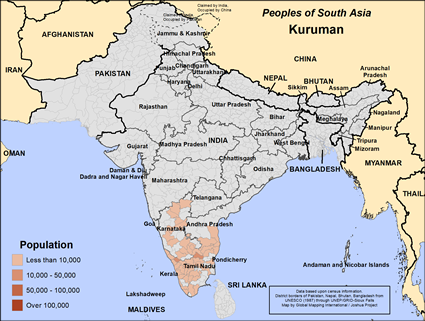The Kuruman inhabit the Nilgiri foothills of Tamil Nadu. They are primarily located in the Coimbatore and Dharmapuri districts of southern India. There are also small communities of Kuruman in parts of the Salamand and North Arcot districts, as well as in adjacent sections of Karnataka and Andhra Pradesh.
Historically, the Kuruman have been best known for their acts of sorcery. As a result, they were feared and other tribes frequently banded together against them. Today, the Kuruman continue to practice sorcery, but the neighboring tribesmen no longer live in personal fear.
In general, the Kuruman have been described as having a somewhat uncouth appearance and as being an exceedingly poor and wretched tribe. They participate in head-shaving, tattooing, and they also wear ear and nose rings.
Traditionally, the Kuruman were hunters and gatherers who also cultivated small plots of fruits and vegetables. They are now in the process of adopting a more settled lifestyle. The Kuruman who live in the jungles on the edges of the plateau still trap small birds and animals and practice crop rotation. With the increasing population and the deforestation, many Kuruman have been forced to live in the lower plateau regions and work on tea or coffee plantations. Sadly, the Kuruman are the poorest of the plateau tribes.
The earliest Kuruman settlements in this region were usually isolated. The people lived in caves, near forest clearings, or in small clusters of huts. Their building materials consist mainly of local timbers and grass thatch. However, in some places, the government has built log houses with brick and mortar.
Since the Kuruman are considered tribals by the Indian government, they automatically qualify for college scholarships and small business loans. They also have priority for most jobs. Nevertheless, it is difficult for them to excel to that level in their living conditions.
The social organization of the Kuruman is very complex. The tribe is possibly divided into seven groups, which differ from each other in dialect and religious beliefs. Within the various clans, rules are strictly enforced. The society is patrilineal in nature, which means that the line of descent is traced through the males. The groups also practice endogamy (marriage within their own clans), and cross-cousin marriages are common. Marriages are usually arranged by families within the same villages. However, eloping is a common practice that must later be pardoned by the panchayat, or village council. Although the villages still have a traditional headman and assistant headman, these offices no longer have much influence.
The Kuruman women dress in colorful cotton saris (lightweight cloths with one end wrapped about the waist to form a skirt and the other draped over one shoulder to cover the head); or long skirts and long blouses with scarves over their heads. The men wear dhotis, which are white loin cloths.
Although the Kuruman are mostly Hindu, their rites and rituals are often connected with sorcery. The Kuruman have a reputation as powerful magicians who can turn themselves into animals. In the past, people feared Kuruman spells and occasionally massacred Kuruman villages in retaliation for a local mishap blamed on their powers.
The Kuruman worship most of the Hindu gods. They also worship various local gods and many objects of nature, such as stones and trees. They believe that many people are possessed with evil spirits, and do not hesitate to sacrifice goats to appease the spirits.
Prayer is the first step toward seeing them reached with the gospel.
Ask the Lord to call people who are willing to go to India and share Christ with the Kuruman.
Ask God to use the small number of Kuruman Christians to share the love of Jesus with their own people.
Pray for effectiveness of the Jesus film among the Kuruman, with many conversions resulting.
Ask the Holy Spirit to soften the hearts of the Kuruman towards the gospel.
Scripture Prayers for the Kuruman in India.
| Profile Source: Joshua Project |











